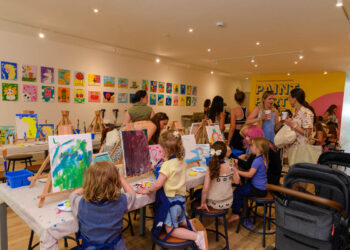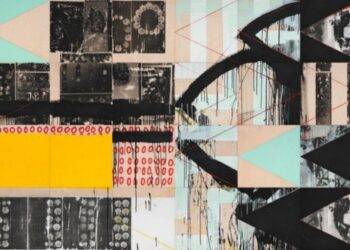The Hamptons International Film Festival (HIFF) features three “Conversations With…” – which this year were all moderated by Alec Baldwin who also serves as Co-Chairmen of the Festival’s Board. On Saturday, October 6, Baldwin sat down at Bay Street Theater with Emilio Estevez, known for the many films he has acted in, but also for his directorial skills. After 12 years of planning, Estevez has released his film The Public – with a cast including Baldwin, Jena Malone, Christian Slater, Gabrielle Union, Taylor Schilling, Jacob Vargas, Michael Kenneth Williams, and Jeffrey Wright.
The film showed on Friday evening of the Film Festival in East Hampton and received rave reviews. Baldwin interviewed Emilio both for HIFF and his podcast on NPR Here’s the Thing… In typical Baldwin fashion, there were very pointed questions with a whole lot of humor in the mix.
Below is a snippet of the interaction:
 |
|
HIFF Executive Director Anne Chaisson, Emilio Estevez and Alec Baldwin. (Photo: Sydney Braat) |
AB: Having worked with you now for the first time and as I look back to all the famous films you did, you don’t seem like you’re all in the movie stardom thing. There seems like there’s a piece of you that isn’t into it. Is that true?
EE: I got into this career to be a working actor like my father [Martin Sheen] who set the tone. When I started he told me ‘No one is ever going to remember your name. Just do work.’ I’ve been very lucky and I’ve had some battles. I’ve never been comfortable with the autographs and the selfies. But all the stuff that comes with it felt so far away from the reason we became actors.
AB: You worked with John Hughes in She’s Having a Baby, what was he like?
EE: He was very curious about everything and that’s what made him such a terrific filmmaker. He asked questions about you.
AB: When did the idea of directing dawn upon you?
EE: I did an annotation that was the least successful thing that turned into a film. It was called That is Then, This is Now. So I was very frustrated coming out of that experience at 23-years-old. I told myself that I’d direct next time. I surrounded myself with a group of extraordinary people, but still had a terrible script. I was determined that no one would tell me what to do, but I should’ve listened to them. So I came out of that experience bruised and broken, but I did another one with Charlie [Sheen] called Men at Work. My mother pulled me aside and she’s the rock of the family. She said you’re making movies about things you don’t know anything about. You know about family and people. My focus changed and I believe I make folk movies.
EE on why he stands up for what he believes in: You know you’re going to lose but you cannot not do it. That has informed the kinds of films that I’m interested in making: emotional and spiritual transformation and movies about people. We have a lot to solve on this planet so let’s focus on what’s here.
AB: There’s so much wrong with our country today, even more than what’s touched upon in the news. When you write a script, do you write a 180 page script and dwindle it down?
EE: Absolutely. When I came off of Bobby, there was a lot of attention around the film. There was a lot of energy about what I’d do next. The script for The Public was 155 pages and I was like ‘I’m not changing a word!’ Of course, we ended up with 108 page final draft. It was an inflated as I could possibly get it. There were so many other stories I wanted to tell. I had this enormous canvas.
AB: I mentioned yesterday how in the wake of Hurricane Sandy that libraries returned to its original purpose: a hub of the community. In Sag Harbor, they were charging people’s phones and paper-slipping books. There were people who hadn’t been to the library in quite some time that went back for entertainment to read a book for old time’s sake.
AB: Can you talk about your experience on The Breakfast Club set?
EE: They put Judd and Ally and me back into a high school. We started attending classes to get that high school vibe. We could be in a school and be anonymous. Anthony Michael, Paul, and Molly were still teenagers and in school at the time. We got along very well.












